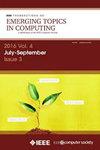Using Diversities to Model the Reliability of Two-Version Machine Learning Systems
IF 5.1
2区 计算机科学
Q1 COMPUTER SCIENCE, INFORMATION SYSTEMS
IEEE Transactions on Emerging Topics in Computing
Pub Date : 2023-10-12
DOI:10.1109/TETC.2023.3322563
引用次数: 0
Abstract
The N-version machine learning system (MLS) is an architectural approach to reduce error outputs from a system by redundant configuration using multiple machine learning (ML) modules. Improved system reliability achieved by N-version MLSs inherently depends on how diverse ML models are employed and how diverse input data sets are given. However, neither error input spaces of individual ML models nor input data distributions are obtainable in practice, which is a fundamental barrier to understanding the reliability improvement by N-version architectures. In this paper, we introduce two diversity measures quantifying the similarities of ML models’ capabilities and the interdependence of input data sets causing errors, respectively. The defined measures are used to formulate the reliability of an elemental N-version MLS called dependent double-modules double-inputs MLS. The system is assumed to fail when two ML modules output errors simultaneously for the same classification task. The reliabilities of different architecture options for this MLS are comprehensively analyzed through a compact matrix representation form of the proposed reliability model. The theoretical analysis and numerical results show that the architecture exploiting two diversities achieves preferable reliability under reasonable assumptions. Intuitive relations between diversity parameters and architecture reliabilities are also demonstrated through numerical examples.利用多样性为双版本机器学习系统的可靠性建模
N 版机器学习系统(MLS)是一种通过使用多个机器学习(ML)模块进行冗余配置来减少系统错误输出的架构方法。N 版机器学习系统所实现的系统可靠性的提高,本质上取决于采用的机器学习模型的多样性以及输入数据集的多样性。然而,无论是单个 ML 模型的误差输入空间还是输入数据分布,在实践中都无法获得,这是理解 N 版架构提高可靠性的根本障碍。在本文中,我们引入了两个多样性度量,分别量化 ML 模型能力的相似性和导致错误的输入数据集的相互依赖性。所定义的度量值被用于计算一种名为依赖双模块双输入 MLS 的元素 N 版本 MLS 的可靠性。假设在同一分类任务中,两个 ML 模块同时输出错误时,系统就会失效。通过所提可靠性模型的紧凑矩阵表示形式,全面分析了该 MLS 不同架构选项的可靠性。理论分析和数值结果表明,在合理的假设条件下,利用两个多样性的架构能获得更佳的可靠性。此外,还通过数值示例证明了多样性参数与架构可靠性之间的直观关系。
本文章由计算机程序翻译,如有差异,请以英文原文为准。
求助全文
约1分钟内获得全文
求助全文
来源期刊

IEEE Transactions on Emerging Topics in Computing
Computer Science-Computer Science (miscellaneous)
CiteScore
12.10
自引率
5.10%
发文量
113
期刊介绍:
IEEE Transactions on Emerging Topics in Computing publishes papers on emerging aspects of computer science, computing technology, and computing applications not currently covered by other IEEE Computer Society Transactions. Some examples of emerging topics in computing include: IT for Green, Synthetic and organic computing structures and systems, Advanced analytics, Social/occupational computing, Location-based/client computer systems, Morphic computer design, Electronic game systems, & Health-care IT.
 求助内容:
求助内容: 应助结果提醒方式:
应助结果提醒方式:


